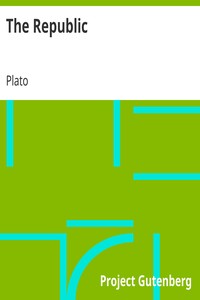The Republic by Plato
"The Republic" by Plato is a Socratic dialogue written around 375 BC. Through conversations between Socrates and various Athenians, this influential philosophical work explores the meaning of justice and whether the just person is happier than the unjust. Socrates examines existing governments and proposes a utopian city-state ruled by philosopher-kings. The dialogue also delves into aging, love, the immortality of the soul, and poetry's role in society, creating one of history's most
enduring works of philosophy and political theory. (This is an automatically generated summary.)
Read or download for free
| Reading Options | Url | Size | |||
|---|---|---|---|---|---|
| Read now! | https://www.gutenberg.org/ebooks/150.html.images | 794 kB | |||
| EPUB3 (E-readers incl. Send-to-Kindle) | https://www.gutenberg.org/ebooks/150.epub3.images | 324 kB | |||
| EPUB (older E-readers) | https://www.gutenberg.org/ebooks/150.epub.images | 336 kB | |||
| Kindle | https://www.gutenberg.org/ebooks/150.kf8.images | 564 kB | |||
| older Kindles | https://www.gutenberg.org/ebooks/150.kindle.images | 520 kB | |||
| Plain Text UTF-8 | https://www.gutenberg.org/ebooks/150.txt.utf-8 | 699 kB | |||
| Download HTML (zip) | https://www.gutenberg.org/cache/epub/150/pg150-h.zip | 318 kB | |||
| There may be more files related to this item. | |||||
Similar Books
About this eBook
| Author | Plato, 428? BCE-348? BCE |
|---|---|
| Translator | Jowett, Benjamin, 1817-1893 |
| Title | The Republic |
| Note | There is an improved edition of this title, eBook #55201 |
| Note | Wikipedia page about this book: en.wikipedia.org/wiki/Republic_(Plato) |
| Reading Level | Reading ease score: 70.3 (7th grade). Fairly easy to read. |
| Language | English |
| LoC Class | JC: Political science: Political theory |
| Subject | Political science -- Early works to 1800 |
| Subject | Utopias -- Early works to 1800 |
| Subject | Justice -- Early works to 1800 |
| Category | Text |
| EBook-No. | 150 |
| Release Date | Jul 1, 1994 |
| Most Recently Updated | Jan 1, 2021 |
| Copyright Status | Public domain in the USA. |
| Downloads | 1720 downloads in the last 30 days. |
| Project Gutenberg eBooks are always free! | |

